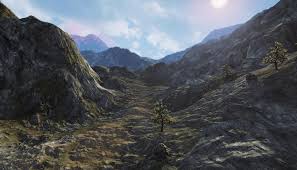中文词源
terrain 地形,地势
terra-,土地,陆地,-ain,名词后缀。引申词义地形,地势。
英语词源
- terrain (n.)
- 1727, "ground for training horses," from French terrain "piece of earth, ground, land," from Old French (12c.), from Vulgar Latin *terranum, from Latin terrenum "land, ground," noun use of neuter of terrenus "of earth, earthly," from terra "earth, land," literally "dry land" (as opposed to "sea"); from PIE root *ters- "to dry" (cognates: Sanskrit tarsayati "dries up," Avestan tarshu- "dry, solid," Greek teresesthai "to become or be dry," Latin torrere "dry up, parch," Gothic þaursus "dry, barren," Old High German thurri, German dürr, Old English þyrre "dry;" Old English þurstig "thirsty"). Meaning "tract of country, considered with regard to its natural features" first attested 1766.
权威例句
- 1. The terrain's high points provide a panoramic view of Los Angeles.
- 在这个地区的制高点能够看到洛杉矶的全景。
- 2. Frank Mariano negotiates the desert terrain in his battered pickup.
- 弗兰克·马里亚诺驾驶他那辆破烂不堪的皮卡车成功穿越了沙漠地带。
- 3. It took us the whole day to trek across the rocky terrain.
- 我们花了一整天的时间艰难地穿过那片遍布岩石的地带.
- 4. He had made a detailed study of the terrain.
- 他对地形作了缜密的研究.
- 5. The terrain is strategically situated and difficult of access.
- 地势险要.

